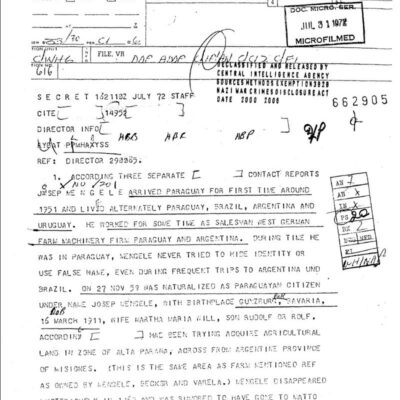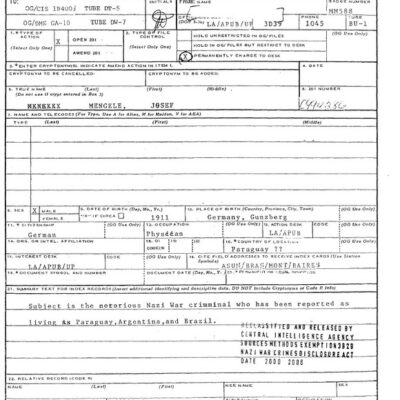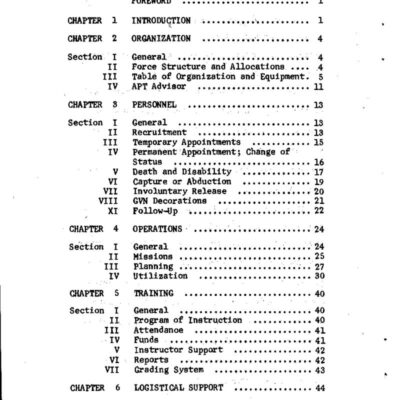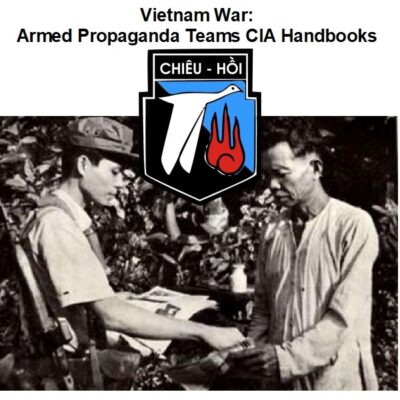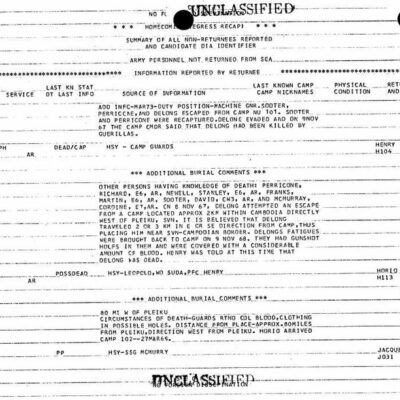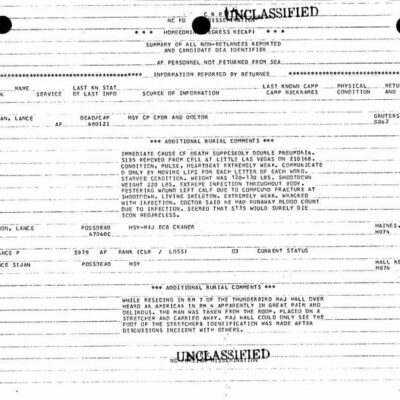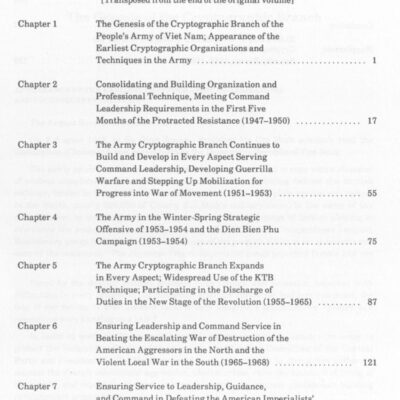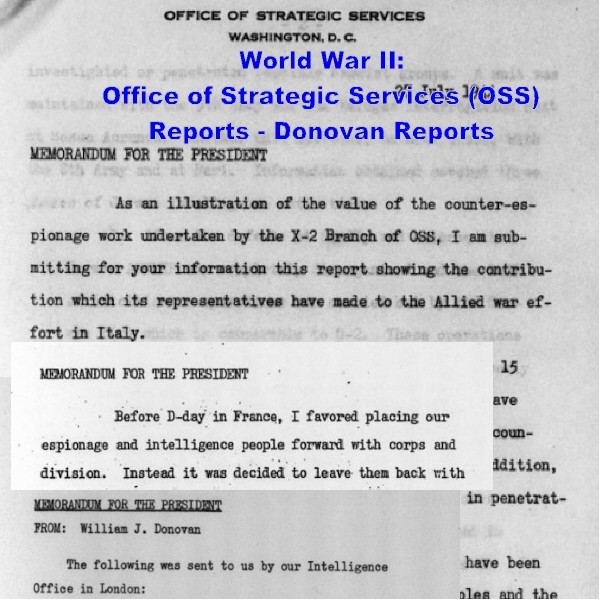
World War II: Office of Strategic Services (OSS) Reports – Donovan Reports
$19.50
Description
OSS Donovan Reports: World War II Intelligence Timeline
Timeline of Main Events (Based on Source Description)
This timeline is based on the description of the “World War II: Office of Strategic Services (OSS) Reports – Donovan Reports” collection and not on the content of the reports themselves.
- December 12, 1941: Earliest date of reports in the collection. These initial reports were prepared by William J. Donovan in his position as Coordinator of Information. They likely focus on early intelligence gathering related to Axis military and economic activities.
- Period after the establishment of the Office of Strategic Services (OSS): William J. Donovan assumes the position of Director of the new agency, the OSS. Reports from this period onwards are issued under his title as Director. The reports continue to focus on Axis powers, including morale, U.S. countermeasures, propaganda, and espionage.
- March 26, 1942 – January 7, 1943: Issuance of “The War This Week” reports by the OSS. These weekly intelligence bulletins chart the military and political progress of the war across all theaters, covering intelligence data, military operations, propaganda, political conditions, and war production.
- Mid-War Period: As the war progresses and America’s role expands, the reports begin to increasingly address the Allied military situation, war aims, and the political situation in Europe.
- Later War Period: Reports start to include information on plans for postwar occupation of Axis territories.
- Specific Events Mentioned (Timeframe not always clear from description):Preparation of reports on the Program of the National Reich’s Church of Germany.
- Intelligence gathering on political conditions in Germany.
- Analysis and planning related to the organization of guerrilla warfare.
- Documentation of U.S. aid to French Resistance groups.
- Reporting on operations in Yugoslavia, Northern Burma, and Central Europe.
- Information on collaboration with the British Special Operations Executive (SOE) in the Middle East and France.
- Reporting on U.S. aid to Yugoslavia.
- Information regarding interaction with the International Transport Workers Federation and the International Federation of Trade Unions.
- Analysis of the Moscow Manifesto to Germany.
- Reporting on operations in the Balkans and the Far East.
- Development of plans for the postwar division of Germany.
- Information obtained through the interrogation of German prisoners of war.
- Reporting on the surrender of German forces in Northern Italy.
- Planning for the postwar organization of secret intelligence services.
- Reporting on a meeting between William Donovan and Franz von Papen in Turkey.
- Discussions and planning related to the trial of German war criminals.
- April 1945: Latest date of reports included in this collection. These reports likely cover the final stages of the war in Europe and continued planning for the postwar world.
Cast of Characters
This list includes the principal people explicitly mentioned in the source description:
- William J. Donovan: (Likely 1882-1959) An American lawyer, soldier, intelligence officer, and diplomat. He served as Coordinator of Information before becoming the Director of the Office of Strategic Services (OSS) during World War II. He played a crucial role in establishing and leading the U.S.’s first centralized intelligence agency. The reports in this collection are primarily addressed to President Roosevelt and originated from Donovan in his various capacities.
- Franklin Delano Roosevelt: (1882-1945) The 32nd President of the United States, serving from 1933 until his death in 1945. As President during World War II, he received and likely reviewed the intelligence reports prepared by William J. Donovan and the OSS. These reports informed his understanding of the war and likely influenced strategic decisions.
- Franz von Papen: (1879-1969) A German nobleman, military officer, and politician. He served in various high-ranking positions in Germany before and during World War II, including Chancellor and Vice-Chancellor under Adolf Hitler. The mention of a meeting between Donovan and von Papen in Turkey suggests intelligence efforts to understand German perspectives or potentially engage in clandestine discussions, particularly as Turkey was a neutral country for much of the war.
World War II: Office of Strategic Services (OSS) Reports – Donovan Reports
6,692 pages of OSS intelligence in the form of memoranda and reports created by the Office of Strategic Services, OSS, and sent by Major General William Donovan to President Roosevelt.
The first reports in the this collection were prepared by William J. Donovan, in his position as Coordinator of Information, they are followed by reports from Donovan in his new position as director of the new agency Office of Strategic Services. They date from December 12, 1941 to April 1945. Most of these reports take the form of memoranda to President Roosevelt.
The purpose of the memos were to relay intelligence gathered relating to the military and economic activities of the Axis powers, data on Axis morale, and suggestions for U.S. countermeasures and responses. They also include information on Axis propaganda and espionage activities in the United States, in Latin America, and in neutral or occupied nations. As America’s role in the war grew, the reports began to deal more with the Allied military situation, war aims, the political situation in Europe, and plans for postwar occupation.
Also included in this collection are Office of Strategic Service’s Coordinator of Intelligence reports “The War This Week,” dating from March 26, 1942 to January 7, 1943. These weekly intelligence bulletins were issued by the OSS to chart the military and political progress of the war in all theaters of operation. They contain information on intelligence data and activities, military operations, propaganda, political conditions, and war production.
Subject highlights among the reports’ topics include:
Program of National Reich’s Church of Germany
Political conditions in Germany
Organization of guerrilla warfare
U.S. aid to French Resistance groups
Operations in Yugoslavia, Northern Burma, and Central Europe
Collaboration with Special Operations Executive in Middle East and France
U.S. aid to Yugoslavia
Interaction with International Transport Workers Federation and International Federation of Trade Unions
Moscow Manifesto to Germany
Operations in Balkans and Far East
Plans for postwar division of Germany
Interrogation of German prisoners of war
Surrender of German forces in Northern Italy
Plans for postwar organization of secret intelligence services
Meeting between Donovan and Franz von Papen in Turkey
Plans for trial of German war criminals












